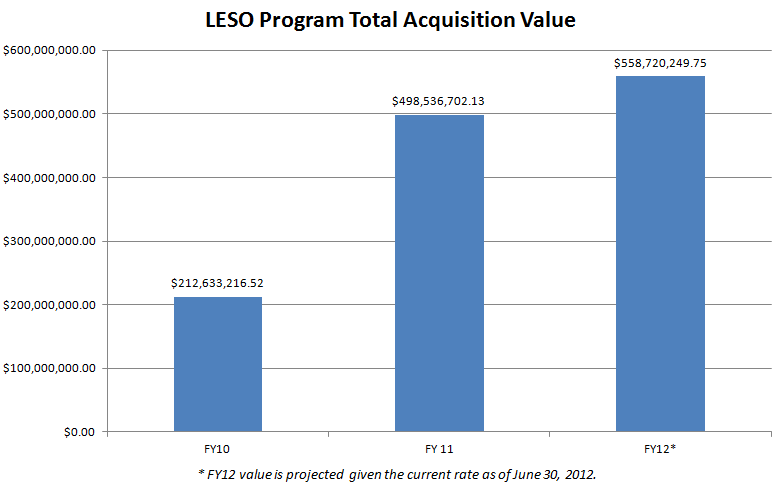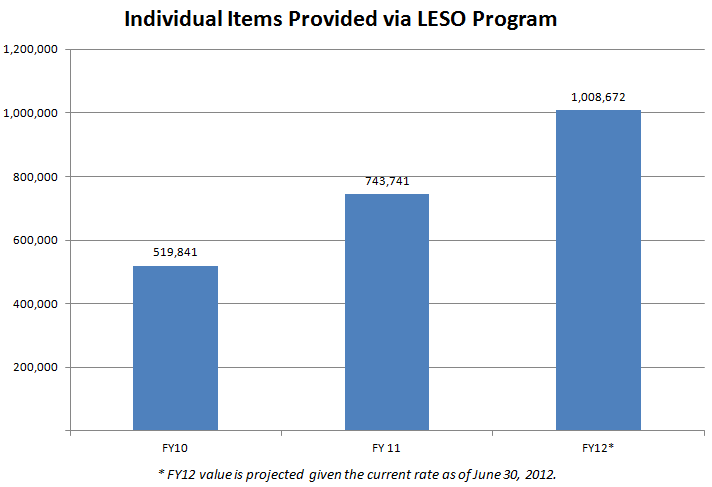
A chart depicting the increasing value of military equipment transfers to civilian law enforcement agencies via the Department of Defense's Law Enforcement Support Office. The FY 2012 value was projected using the current rate of transfer as of June 30, 2012.
Public Intelligence
Law enforcement agencies around the U.S. are obtaining record amounts of surplus military equipment through the Department of Defense’s Law Enforcement Support Office (LESO). Nearly half-a-billion dollars of equipment has already been provided to law enforcement agencies in the first three quarters of 2012, making this year’s transfer of property set to be the largest in the history of the LESO program.
Since the early 1990s, DOD has been providing excess “personal property” to civilian law enforcement agencies, including weapons, vehicles and aircraft. Section 1208 of the FY1990 and FY1991 National Defense Authorization Acts (NDAAs) authorized the transfer of excess DOD property for federal and state law enforcement agencies for use in counter-drug activities. Section 1033 of the FY1997 NDAA expanded this authority by enabling the transfer of excess DOD personal property to federal and state law enforcement. Under the control of the Defense Logistics Agency (DLA), the “1033 program” has provided equipment to more than 12,000 agencies in the U.S. Since the first program was activated in the early 1990s, more than $2.6 billion worth of equipment has been provided to all 50 states, 4 U.S. territories, the District of Columbia, and hundreds of federal and tribal law enforcement agencies.

A chart depicting the increasing number of individual items provided to civilian law enforcement around the country via the LESO program.
Statistics made available by the DLA show that the amount and value of equipment provided to law enforcement agencies under the program has steadily increased in recent years. The total acquisition value of equipment provided to law enforcement more than doubled in FY2011 and is set to increase by nearly $60 million this year. As of June 30, equipment transfers for FY2012 are on a course to top $550 million in total acquisition value, more than a fifth of the total value of all equipment transferred by the program since the early 1990s.
This increase in value has corresponded to a similar increase in the overall number of items provided under the program. Equipment transfers in FY2012 will likely reach more than 1,000,000 individual items, fulfilling nearly 70,000 individual requests by law enforcement agencies. This represents a substantial increase from the 743,731 items provided in FY2011 under the program. The overall number of law enforcement requests serviced by the LESO are set to increase nearly 75% from FY2011. Both the total acquisition value and total number of items provided through the program have increased substantially since 2010, rising particularly high in 2011 due to “unparalleled activity” that “resulted in record numbers of property requisitions and property transferred.”
Presentations on the LESO website detail the kinds of weapons and equipment available to law enforcement, such as M-16 and M-14 rifles, as well as M1911 .45 caliber pistols. The presentations state that mine-resistant ambush protected (MRAP) vehicles are not available to law enforcement, though several variants of highly mobile multi-wheeled vehicles (HMMWVs) and a variety of military helicopters are available for transfer. Another program promoted by the LESO offers to lease night-vision devices to law enforcement at a rate of $300 per unit per year.
|
